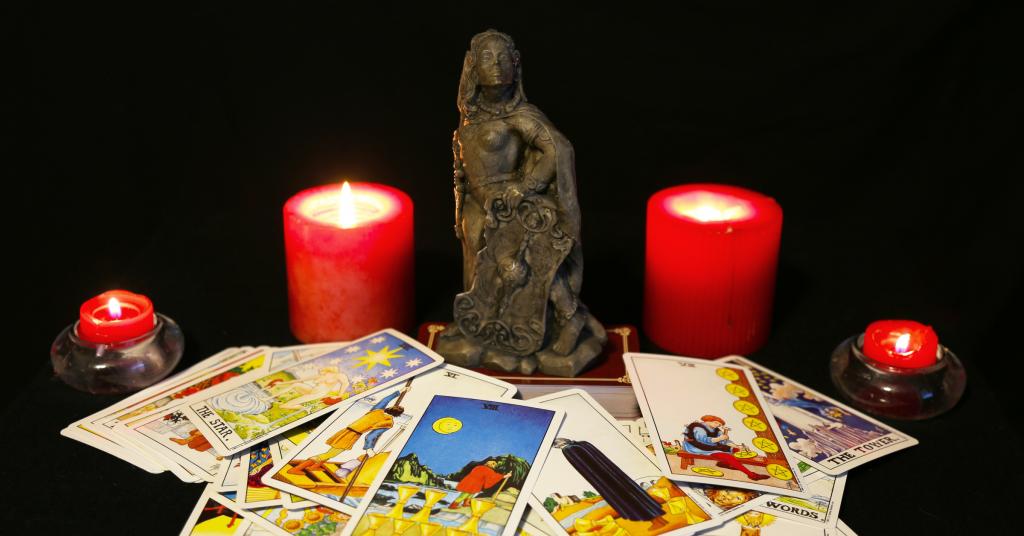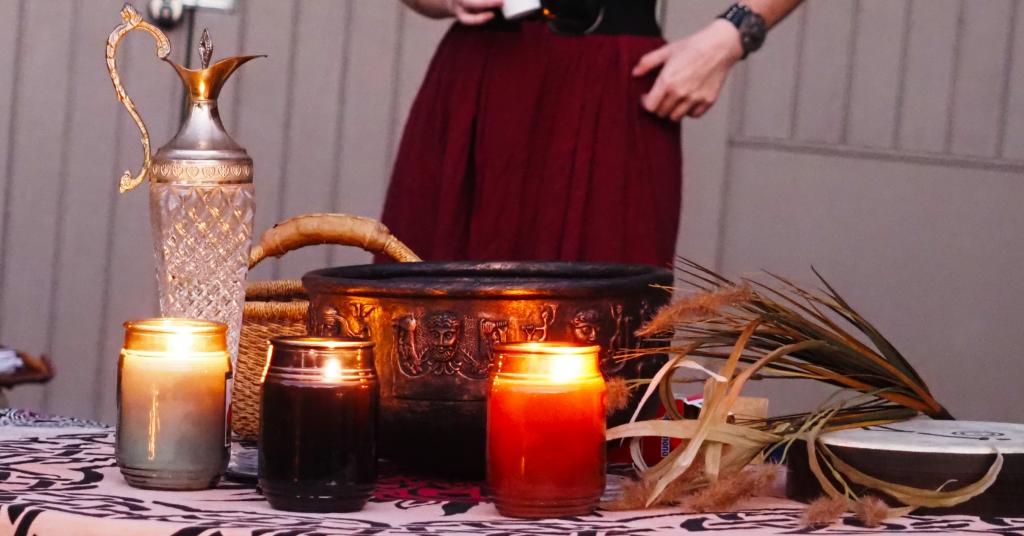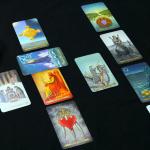1. The religion I practice is a form of oracular, ecstatic polytheism. Among other things, that means I and many other polytheists (though far from all) experience the Gods for ourselves. We speak to Them, and They speak to us.
2. Sometimes we use divination to confirm the messages we get from deities and other spirits. What we experience is necessarily subjective – divination is one way to confirm and clarify what we hear. This is especially important when we receive a message to deliver to someone else.
3. In my last post, I talked about people who rely too much on divination. While it’s natural to want to know what’s coming, some people look to divination to tell them things are going to be alright rather than trusting in their ability to handle whatever comes their way.
4. In that post, I pointed out that my confirmation readings are often blunt and even sarcastic: “yes, that’s what I said, now go do it!”
Do you see where this is going?
Hearing the voice of the Morrigan
A few days ago I approached the Morrigan on behalf of someone else. The details are confidential, but not particularly relevant to this post. The Great Queen gave me a message to relay that was quite clear, although I had to meditate on it for a while to find the precise words to use in my report. I had to translate images and concepts into words so I could relay it accurately to the person who asked for my help.
As I was ending the session, I said – more to myself than to Her – “OK, now I need to pull cards and confirm this.”
“NO!”
That got my attention.
“You know my voice – stop being tentative and do the work.”
Contrary to what some think, I don’t get orders from deities very often. I’m responsible for my own life and my own direction. But when I do get direct orders, I do my best to follow them. I relayed the message without attempting to confirm it with divination.
And as I did, I realized there was more to all this than making sure I really heard what I thought I heard.
This isn’t a problem for most people
Most religious practice is simply doing the basics over and over again. This is as true in the Pagan polytheism I practice as it is in Christianity, Buddhism, or any other religion.
We pray, meditate, and make offerings. We celebrate the high days and holy days. We strive to embody the virtues of our Gods, and to promote Their values in this world. We build and maintain respectful, reciprocal relationships with other persons, some of whom are human and some of whom are not.
We do this over and over again: day after day, month after month, season after season, year after year. Eventually it stops being something we do and starts being part of who and what we are.
True spirituality does not come from discovering hidden knowledge or from developing great power. It comes from integrating core principles and practices into our lives and into our souls.
That’s all most people are called to do.
It’s all most people want to do.
It’s enough.
But some are called to more.
A recurring theme on this blog over the years is that some people are called to explore off the edge of the map. We’re called to do things other people can’t, or more often, that other people won’t. That doesn’t make us better or more important than everyone else. It mostly just makes us busier.
But if you’re one of those people, the rest of this is for you – if not now, then at some point on your journey.
The primacy of our own experiences
We live in a society where the loudest people scream there is only one God and the second loudest scream there are no Gods. Both groups proselytize extensively – and often, disrespectfully. We can’t help but hear them, especially those who grew up in their traditions… which is most of us.
Building an experiential case for the reality of many Gods is one of the core themes in The Path of Paganism and Paganism in Depth. Polytheism is a reasonable religious approach. More than that, it’s a meaningful and helpful approach. That should be good enough. But in this society, often it isn’t.
On one hand, we understand that the Gods are a mystery. We want to remain intellectually honest and religiously humble – we never want to be like the fundamentalists who scream “God said it, I believe it, that settles it.”
On the other hand, my first-hand encounters with the Gods are some of the most real experiences of my life. I will never be able to convince skeptics that they’re real, but I don’t have to. This path isn’t for everyone, and if they’re happy as atheists or Christians, so be it.
But I do have to convince myself.
You know it’s real… until you start talking yourself out of it
When these experiences are happening, they’re absolutely and unquestionably real. Sometimes terrifyingly real. After they’re over, though, it’s easy to fall back into rationalizing them away.
When you’re just starting out, this is to be expected. It’s all new – you have no frame of reference for it. After you’ve had three or four encounters with a deity, it gets to the point where it’s easier to just go with it. After you’ve been doing this for 15 years (my first ecstatic experience of a deity was in 2006) it’s part of your life and your practice.
But doubts remain. And not the kind of healthy doubts that keep us humble and honest. The kind of lingering doubts that keep us from letting go and immersing ourselves in the experience of our Gods. The kind of doubts that keep us tethered to shore when we need to be exploring uncharted seas.
And insisting on outside confirmation feeds those doubts.
Hearing the Gods for ourselves
We speak of “hearing” the Gods, but we rarely hear with our physical ears. Or at least, I don’t. It’s more a case of thoughts in your head, except you’re pretty sure they’re not coming from inside your head.
People ask me “how can I be sure I’m not just imagining it all?” That’s a fair question. It starts with knowing yourself, with knowing your own thoughts and feelings, your own hopes and fears. When you know what’s you, it’s easier to recognize what’s not you.
If what you hear tells you what you wish was true even though you know it’s not, or if it tells you your deepest fears are going to come true, that’s probably you. If what you hear tells you what you know is true even though you wish it wasn’t, or if it tells you something you have no way of knowing, that’s probably not you. It’s more complicated than that, but that’s a good place to start.
Does that mean you’re hearing from a God? Maybe – that’s another post for another time (and maybe fairly soon). When you’re starting out it can be hard to tell who’s speaking to you and exactly what they’re trying to communicate.
In those cases, divining for confirmation is a wise thing to do.
I don’t know every voice
Over time you start to recognize voices. Thoughts, concepts, visions, impressions – all the “pattern matching” that is both analytical and intuitive.
I know the Morrigan’s voice – I’ve heard it often enough and loudly enough for long enough. I know Cernunnos’ voice, even though He often speaks without words. I haven’t had divination or experience contradict my interpretation of Their messages in many years.
I’m less certain when it comes to Brighid or Lugh or Isis. And even though I’ve worked with and for Her off and on for many years, I’m just starting to recognize Cerridwen.
There are many Gods. I recognize a few of Them by voice. The rest I still need to work to verify and validate, because getting it right is important.
But I know the Morrigan’s voice. And I need to stop reinforcing harmful doubts.
You know my voice
The message to me is two-fold. First, there’s the obvious: I need to stop doubting that I’m actually hearing from the Morrigan (and Cernunnos, and maybe a few others). Yes, I need to remember to be mindful about such messages, to make sure that I’m not confusing my words for Hers. But I’ve been doing that, and – as the cards have been telling me – my caution is less about humility and more about lingering doubts. Hindering doubts.
But then there are the implications behind the obvious. “Stop being tentative and do the work” doesn’t just refer to delivering this one message. Or any messages.
It refers to exploring off the map – something I’ve talked about doing multiple times over the past 20 months but haven’t done often enough. It refers to investigating the spiritual and magical implications of Tower Time – something I’ve done in some depth, but haven’t come close to finishing. Perhaps most importantly, it refers to preparing for the next phase of my life – a phase that won’t start for several more years, but apparently isn’t going to be what I’ve always expected it would be.
I’m not sure how all this will play out. But know this much: I don’t just recognize the Morrigan’s voice. I trust Her, because She’s never led me wrong.
And so there is no reason to indulge unhealthy doubts.
Where do you fit into this?
This is a public blog, not my private journal. What does this have to do with you, the reader? Where do you fit into all this?
If none of this rings a bell, if none of it sparks any interest, then at least you’ve learned something by reading this post. Honor your Gods and live a virtuous life. The Gods know we need more people who do.
If this sounds interesting but it’s something you’ve never experienced yourself, keep practicing. First-hand experiences of the Gods happen when They decide, not when we want them. But there are things we can do to put ourselves in a better position for them to happen.
If you’ve had one or more such experiences, treasure them. Do your best to interpret them accurately, but never let anyone tell you they weren’t real. They were, and they are. If divination helps you confirm them, do it.
But if you know the voice you hear, if your God or Gods have proven trustworthy, then trust Them.
You will never convince the skeptics that your experiences are real. You don’t have to – converting the world isn’t part of our mission. You just have to convince yourself.
Healthy doubts keep us honest and humble. Unnecessary doubts hinder us from having the deep experiences we need and want.
Trust the voice you know.




















